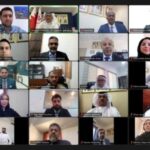Reality television has become a staple in the entertainment industry, captivating audiences with its unscripted and spontaneous nature. Mazen Laham, the mastermind behind popular shows like Dubai Bling, It’s OK, and Shark Tank, has garnered success in the world of reality TV. Laham’s journey in television production began with a degree in Radio, TV, and Film from the Lebanese American University, followed by an internship at CNN in London. He then spent about a decade at LBCI TV in Lebanon, producing shows like Ahmar bil Khat el Areed and Gladiators. In 2014, Laham founded Different Productions, where he continued to produce successful shows such as Dubai Bling and Shark Tank.
Laham’s interest in television production stemmed from a childhood curiosity about the magic behind the scenes. Initially studying Business Administration, he found his true passion in the world of Radio/TV and Film. With the advent of OTT platforms, television production has undergone a significant transformation. These platforms have democratized content creation, expanded global accessibility, and introduced adaptable release strategies. OTT platforms also leverage data-driven analytics to enhance viewer satisfaction and engagement. This shift has revolutionized the television industry, offering more opportunities for diverse creators and content.
Dubai Bling, one of Laham’s successful productions, received widespread acclaim but also faced criticism for perpetuating stereotypes about Dubai as a hub for luxury living. However, Laham believes that Dubai’s allure goes beyond materialism, encompassing innovation, entrepreneurship, and multiculturalism. He emphasizes that Dubai Bling is not a documentary about the city but rather a reality series focusing on the lives of a group of friends in Dubai. The city is portrayed as a dynamic metropolis with cultural diversity and economic vitality, offering endless opportunities for personal and professional growth.
Reality television continues to be popular among modern audiences for its voyeuristic appeal, unscripted nature, and diverse narratives. Viewers are drawn to the authenticity and rawness of reality TV shows, which often capture genuine moments of emotion and conflict. These shows offer a unique platform for viewers to connect with the human experiences and stories of the participants. Additionally, reality TV sparks conversations and reflections on social issues and human relationships, prompting viewers to consider their own values and beliefs.
In non-scripted shows like Dubai Bling, cultural sensitivity is paramount. Laham emphasizes the importance of respecting the cultural norms and values of the communities portrayed in his productions. By incorporating awareness of cultural diversity and inclusivity into the creative process, Laham aims to create content that resonates with audiences worldwide. The third season of Dubai Bling promises a compelling narrative filled with captivating drama, hinting at an exciting viewing experience for fans of the show.
In conclusion, Mazen Laham’s journey in television production and his success with shows like Dubai Bling highlight the evolving landscape of reality television. As the industry continues to embrace diversity, cultural sensitivity, and authentic storytelling, reality TV remains a powerful medium for engaging audiences and sparking meaningful conversations. With the rise of OTT platforms and innovative storytelling techniques, the future of television production looks bright, promising more compelling content and immersive viewing experiences for audiences worldwide.











